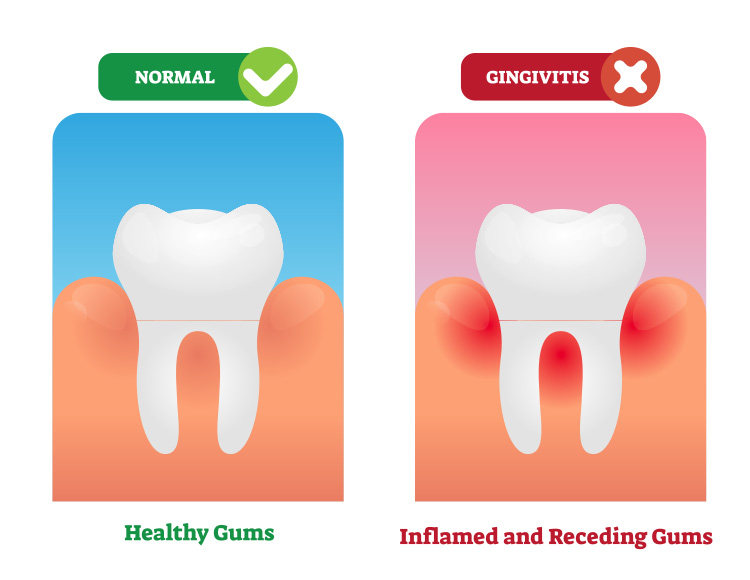When many people think of good dental hygiene practices, they only consider their teeth. Caring for your gums, and preventing conditions such as gingivitis, is vital for both your oral health and overall well being.
Gingivitis is incredibly common, and according to the Canadian Dental Association, 70% of Canadians will develop gingivitis at some point during their lives.
By flossing at least once per day, and brushing at least twice per day and visiting your dentist regularly, you can protect your teeth and gums from disease and decay.
What is Gingivitis?
Gingivitis is a mild form of gum disease that is characterized by gum inflammation, irritation, and redness in your gingiva (the part of your gum that sits around the base of your teeth). Gingivitis occurs when plaque, a clear, sticky substance produced by bacteria that forms on your teeth every day, is not removed. Plaque causes both gum inflammation and tooth decay, which is why it is essential to brush and floss thoroughly every day.
When plaque is not removed, it hardens into tartar, which can only be removed by your dentist or dental hygienist using specialized cleaning tools.
If gingivitis is allowed to progress untreated, it can lead to a much more severe gum disease called periodontitis, which can cause tooth loss.
Signs and Symptoms
Healthy gums should be pale pink and fit snugly around the base of each tooth. Signs and symptoms of gingivitis include:

- Swollen or inflamed gums
- Bright or dark red gums
- Shiny gums
- Gums that bleed easily when you floss or brush
- Tender gums
- Receding gums
- Unexplained tooth sensitivity
- Bad breath
- A persistent metallic taste in your mouth
Early stage gum disease such as gingivitis is difficult to spot, so you may not even know you have a problem until you visit your dentist. Your dentist and dental hygienist are specially trained to look for gum disease, which means they are more likely to spot it during its early stages.
To check for gingivitis, your dentist may use a dental tool called a periodontal probe, which is used to measure where your gums attach to your teeth. Healthy gums attach just below the edge of the gum, while gums with gingivitis typically attach lower down, creating a pocket where plaque and bacteria can gather.
Gingivitis Risk Factors
Risk factors that increase your chances of developing gingivitis include:
- Poor dental hygiene: If you aren’t brushing at least twice per day for two minutes, or flossing at least once per day, you are more likely to develop gingivitis.
- Smoking or chewing tobacco: Using tobacco products can cause a wide variety of health problems including cancer, lung disease, heart disease, and gum disease.
- Hormone fluctuations: Women, in particular, are more likely to develop gingivitis during hormonal changes, such as during puberty, menstruation, pregnancy, and menopause.
- Your age: Older individuals are also more likely to develop gingivitis than younger individuals.
- Genetics: Individuals with a family history of gingivitis and other gum diseases are more likely to develop gum disease themselves.
- Poor nutrition: A poorly balanced diet, particularly one that does not contain enough vitamin C, increases your chances of developing gingivitis.
- Crooked teeth: Poorly fitted dental restorations or crooked teeth are difficult to clean, making it harder to ensure you are removing all plaque and food residue.
- Certain medications: Medications such as phenytoin for epileptic seizures, calcium channel blockers for angina, birth control pills, and high blood pressure medications can increase your risk. Select cancer treatments, which compromise your immune system, can also increase your chances of developing gingivitis.
- Certain medical conditions: Select viral and fungal infections can increase your chances of developing gingivitis. Conditions that compromise your immune system, such as HIV/AIDS or leukemia also make you more susceptible to gingivitis.
Treatment Options
Which treatment option is best for you depends on several factors including how serious your gingivitis is.
Gingivitis
The best way to treat gingivitis in its early stages is to undergo a professional dental cleaning by your dentist or dental hygienist to remove any built up plaque or tartar.
You should also develop or continue to maintain a comprehensive at home oral hygiene routine. This routine should consist of brushing at least twice a day (for at least two minutes) and flossing thoroughly at least once per day to remove plaque, bacteria, and food particles.
Periodontitis
If your gingivitis has progressed beyond the early stages and become periodontitis, your dentist may refer you to a periodontist. A periodontist is a specialized dentist who has at least three additional years of university training in the treatment of gum disease and has the necessary skills to restore or regenerate bone and gum tissue that has been lost because of gum disease. Your periodontist will treat your gum disease, but if your gum disease has progressed to periodontitis it is even more critical to maintain a comprehensive at home oral hygiene routine.
Preventing Gingivitis
There are a variety of things you can do to help ensure that you don’t develop gingivitis. These include:

- Good oral hygiene practices: By brushing your teeth at least twice a day, for at least two minutes per session and flossing at least once per day you can help reduce your risk of developing gingivitis. If possible, you should brush your teeth after every meal and snack, so that food particles and plaque don’t remain on your teeth.
- Regular dental visits: You should be visiting your dentist and dental hygienist regularly for cleanings, typically every six to twelve months. However, depending on your oral health and gum disease risk factors your dental team may recommend that you have your teeth professionally cleaned more frequently. Annual dental x-rays can also help your dental team identify gum diseases and other serious conditions that may not be noticeable during a standard visual exam, and allow your dental team to better monitor changes in your dental health.
- Overall healthy practices: Good health practices such as a balanced diet with lots of vitamin C can help you keep your gums, and the rest of your body, healthy. Individuals with diabetes should also be sure to manage their blood sugar levels effectively to help maintain their gum and overall health.







